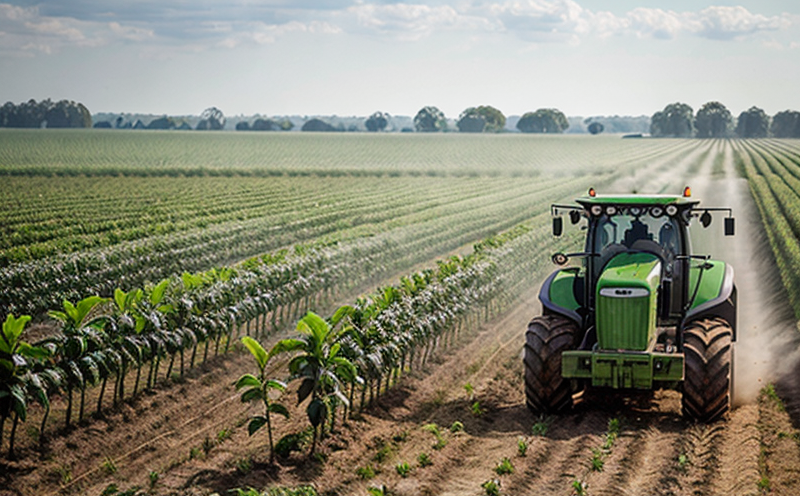CFR 40 Agricultural Effluent Testing for Chemical Safety
The Comprehensive Environmental Response, Compensation, and Liability Act (CERCLA), more commonly known as Superfund, and its regulations found in Title 40 of the Code of Federal Regulations (CFR) are integral to ensuring environmental safety. One critical area regulated under CFR Part 435 is agricultural effluent discharge into surface waters. This regulation mandates that certain chemical substances present in agricultural runoff must be tested for their potential impact on water quality and aquatic life.
The primary objective of this testing is to ensure compliance with federal standards aimed at preventing pollution from entering water bodies, thereby protecting public health and the environment. The CFR 40 Agricultural Effluent Testing involves a series of analytical procedures designed to detect trace amounts of chemicals that might be present in agricultural runoff due to practices such as pesticide use or fertilization.
The testing protocol is meticulously detailed in CFR Part 435. It includes the identification and quantification of specific chemical compounds, such as pesticides, herbicides, nitrates, and phosphates. Compliance with these regulations is crucial for agricultural businesses to avoid potential legal penalties and to uphold their environmental responsibility.
The testing process typically starts with a thorough examination of the effluent sample using advanced analytical techniques like gas chromatography-mass spectrometry (GC-MS), liquid chromatography-tandem mass spectrometry (LC-MS/MS), and inductively coupled plasma-mass spectrometry (ICP-MS). These sophisticated instruments enable precise measurement down to parts per billion or trillion levels, ensuring accurate detection of even trace amounts of harmful chemicals.
Once the chemical analysis is complete, a detailed report summarizing the findings is generated. This report outlines the concentration levels of each detected compound and compares these against the permissible limits specified in CFR 40 Part 435. The results are presented alongside recommendations for mitigation strategies if any chemical exceeds the allowed threshold.
Compliance with CFR 40 Agricultural Effluent Testing is not only a legal requirement but also a critical step towards sustainable agricultural practices. By adhering to these regulations, farmers and agricultural organizations can safeguard their operations from potential environmental damage and regulatory repercussions. Furthermore, this testing helps in fostering trust among consumers regarding the safety of food products derived from compliant farms.
Understanding the nuances of this regulation is essential for all stakeholders involved in agriculture. Quality managers, compliance officers, R&D engineers, and procurement teams play pivotal roles in ensuring that their operations meet regulatory standards. This includes implementing best practices during sample collection, selecting appropriate analytical methods, and interpreting results accurately.
Eurolab Advantages
At Eurolab, we pride ourselves on providing unparalleled expertise and top-tier services in agricultural chemical testing. Our team of highly skilled scientists and technicians is committed to delivering accurate, reliable, and timely test results that meet or exceed the stringent requirements set forth by CFR 40 Part 435.
- Comprehensive Analytical Capabilities: Eurolab leverages state-of-the-art instrumentation such as GC-MS, LC-MS/MS, and ICP-MS to conduct thorough chemical analyses. Our laboratory is equipped with the latest technology, ensuring precision and reliability in every test.
- Expertise and Experience: With years of experience in environmental testing, our professionals understand the complexities involved in agricultural effluent analysis. We stay updated with the latest regulatory changes and best practices to provide relevant and compliant services.
- Rigorous Quality Assurance: Our commitment to quality is reflected in our stringent internal controls and adherence to international standards like ISO/IEC 17025, ensuring that all test results are accurate, repeatable, and traceable.
- Client-Centric Approach: We prioritize client satisfaction by offering personalized service and flexible scheduling. Our dedicated team is always available to address any concerns or questions you may have throughout the testing process.
By choosing Eurolab for your agricultural effluent testing needs, you can trust that we will deliver comprehensive insights into the chemical composition of your samples, helping you make informed decisions regarding compliance and sustainability.
Why Choose This Test
- Regulatory Compliance: Ensure adherence to federal regulations by conducting thorough agricultural effluent testing. This helps prevent potential legal issues and maintains good standing with regulatory bodies.
- Eco-Friendly Practices: Protect the environment by identifying and mitigating harmful chemical impacts on water quality. Sustainable practices are essential for long-term ecological health.
- Consumer Trust: Demonstrate your commitment to producing safe, high-quality agricultural products that meet or exceed regulatory standards. This enhances consumer confidence in your brand.
- Data-Driven Decisions: Gain valuable insights into the chemical profile of your effluent through detailed test reports. Use this information to optimize farming practices and enhance operational efficiency.
In summary, CFR 40 Agricultural Effluent Testing is a vital component of maintaining environmental responsibility in agricultural operations. By partnering with Eurolab, you can leverage our expertise and resources to meet regulatory requirements while contributing positively to the environment.





